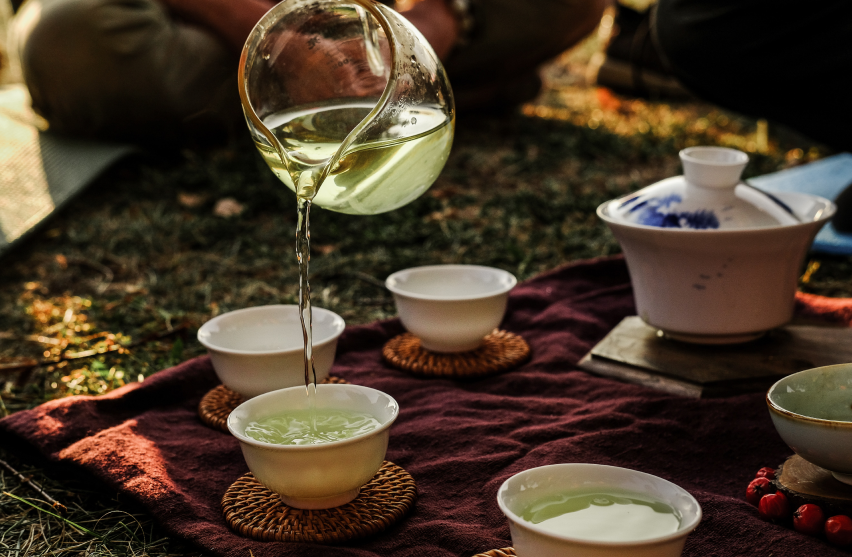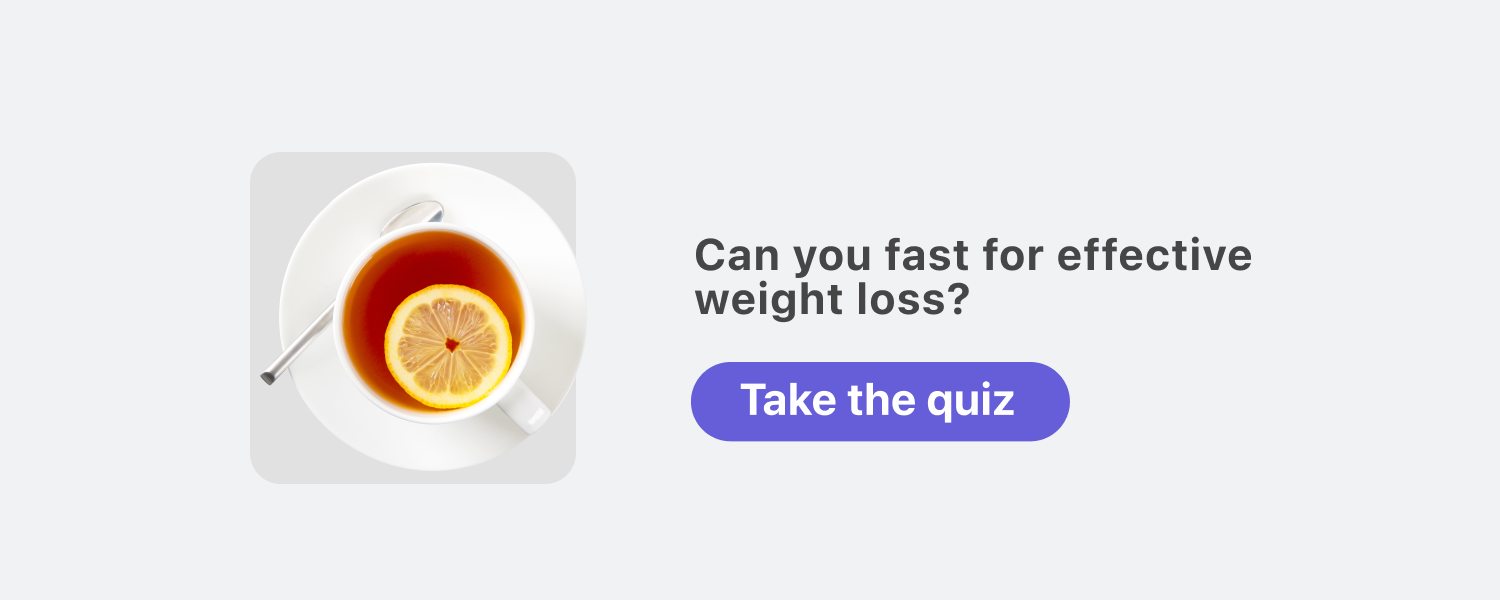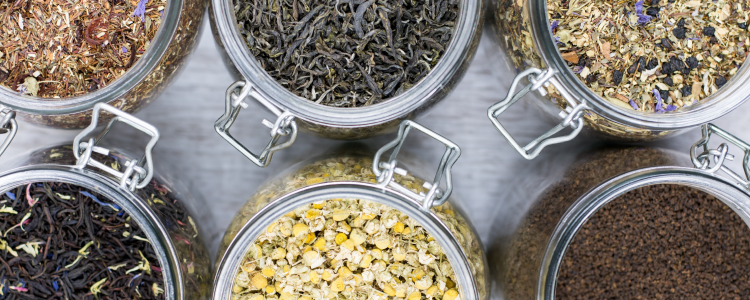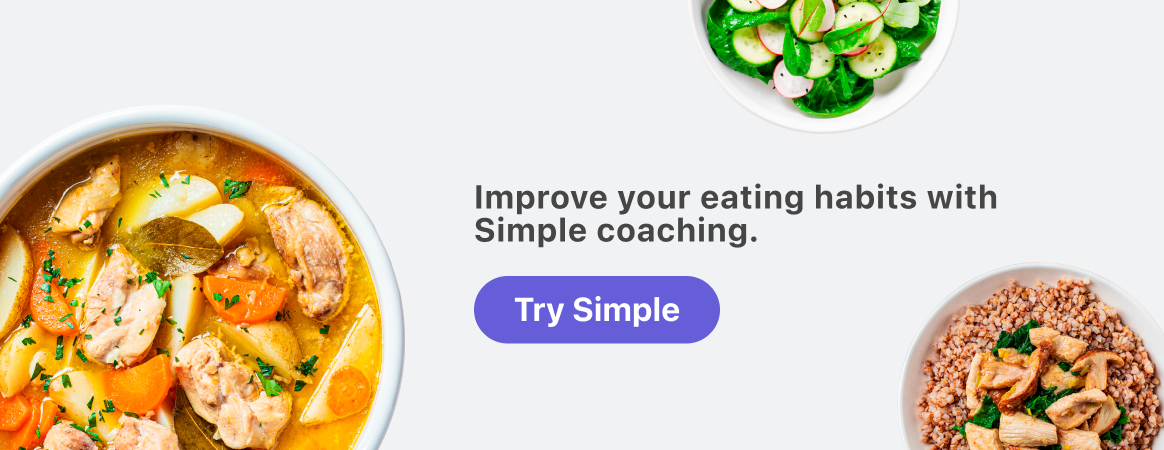Can you drink tea while fasting? — explained by Simple

Picture this.
It’s Sunday evening, and you’re already a couple hours into your fasting window. A friend comes round so you can binge-watch your favorite show together. They bring with them a funky new kind of herbal tea.
Suddenly, the fasting alarm goes off in your head. Can you drink this?!? Or is tea a no-no during intermittent fasting?

Let’s make sure this never happens to you by resolving all your tea-related quandaries.
Can you drink tea while fasting? Time to find out!

So, can you drink tea while intermittent fasting?
First things first, hop over here if you need a refresher on what intermittent fasting is. If you’re brand new to intermittent fasting, take our Simple quiz to figure out what your best approach is, and you’ll be an intermittent fasting pro in no time. Now, if your intermittent fasting knowledge is sound, settle in, and let’s chat about where tea fits.
Can you have tea while intermittent fasting? The short answer: yes, you can.
But you may have to adjust how you take your tea.
When you’re fasting, eating — or drinking — anything containing calories is out.
If you traditionally like your tea with a lot of milk, cream, and/or sugar, that’s not gonna fly. But it’s the milk, cream, and sugar that are the problem here. They’re what break your fast.
The tea itself is fair game.
With a few simple adjustments and a curious attitude, tea could become one of the things that help you get through your fasts with less hunger- and craving-related struggles.
Drinking lots of water during a fast is highly, highly recommended. Some days, though, plain, cold water is just … ugh. There’s nothing enticing about it.
Enter stage left … all the teas in the land. (And a few other drinks that make the cut for what you can drink while fasting.) If this is a whole new world for you, don’t worry. We’ll cover some of the best teas to try a little later.
P.S. If you’ve been feeling like intermittent fasting is not working for you, check how you have your tea. Could it be that you’ve inadvertently been breaking your fast?
The health benefits of drinking tea while intermittent fasting

Let’s see if tea really is all it’s cracked up to be. Are there actually legit health benefits of drinking tea during intermittent fasting?
Why yes, there are!
Avoiding dehydration
When you fast, you also (more than likely) limit the amount of food you eat.
The food you eat contains around a third of your regular daily fluid intake. So unless you drink plenty of water while fasting, it’s easy for dehydration to sneak up on you.
If you find drinking plain old water difficult, finding interesting teas that turn on your taste buds will help.
(As will making the most of your options on what to eat during intermittent fasting and giving yourself a plentiful fruit and veggie intake.)
That’s a belt-and-suspenders approach to making your fasting window a dehydration-free zone!
A note on caffeinated teas: You may be thinking, “If tea contains caffeine … isn’t that a diuretic?” Well, interestingly, tea is generally found to be as hydrating as water.[1] However, in large quantities (e.g., above 300 mg of caffeine, so around 7 cups of caffeinated tea), it maaaay make you pee more, meaning greater fluid loss. Something to bear in mind!

Making better food choices
Some teas are sweet even without sweeteners (licorice tea, we’re looking at you!).
These can be tremendously useful for satisfying a sweet tooth, managing your appetite, and reducing cravings.
This means that when you slide back into your eating window, you’re not raging for a fix of cookie dough or candy, and you can get on with eating your healthful, nutrient-packed chicken and veggie soup like you’d planned.
All hail tea as a way to side-step one of the more unruly intermittent fasting side effects!
More antioxidants
Drinking tea brings a type of polyphenols, called flavonoids, into your life and body.
These chemical compounds have strong antioxidant properties and can reduce the oxidative stress caused by free radicals. This, in turn, reduces your risk of chronic diseases.
Studies show that all caffeinated plain teas have roughly the same amount of these chemicals, but each has its own starring kind. For instance, green tea has higher levels of epigallocatechin-3 gallate (EGCG), while black tea is strongest in theaflavins.[2]
Herbal teas also contain polyphenols, making these a solid health bet, too.
Reduced risk of stroke and cardiovascular disease
Your heart health may benefit from having more polyphenols in your diet.
Drinking green tea and oolong tea has been associated with a lower risk of death from cardiovascular disease.[3]
A 13-year study found that drinking 2–3 cups of green tea a day was linked to a 14% lower risk of stroke, and drinking 4 or more cups daily with a 20% lower risk.[4]
Black tea has been shown to have a similar impact.[5]
Better blood pressure
Flavonoids may do good things for your blood pressure.
Studies show that regular green and oolong tea consumption can reduce the risk of developing high blood pressure, and long-term black tea drinking could lower it.[6,7]
In fact, new research found that men who drink 3+ cups of tea per day were less likely to develop hypertension than those who don’t drink tea at all. This may be connected to the beneficial changes in our gut microbiota that occur from drinking tea.[8] However, this particular study didn’t find the same results for women.
Lower cholesterol
There is evidence that both black and green tea may lower LDL cholesterol levels, but more research is needed to confirm this.[9,10]
Speedier metabolism
It’s possible that tea could help improve metabolism due to flavonoids called catechins.[11]
Something else that potentially improves metabolism … intermittent fasting! So, if you’ve ever wondered, “Does intermittent fasting slow metabolism?” you can safely say no and know that tea helps too.
Extra credit for intermittent fasters
Some research suggests that adding milk may reduce the antioxidant capacity of tea.[12] So, by drinking your tea “fasting-style” (i.e., without milk), you’re potentially doing your health an extra favor.
If you’re new to this whole idea of intermittent fasting and looking to get started, check out our guide to intermittent fasting for beginners. Then, once you’ve done that, take our Simple quiz, and we’ll help you get Day 1 underway!
What kind of tea can you drink while fasting?

Now the fun part: which teas you can drink during intermittent fasting!
Although coffee has long been the drink-du-jour, tea is fighting back. No longer just the dreary, over-brewed cup of brown water you get when you go visit your grandma, tea now comes in the kind of funky AF flavors you’d usually only see on a coffee shop menu.
Look for an artisan tea maker in your area (or online), try other products like tea leaves, not just teabags, and see how your tea universe expands.
In the meantime, here’s a rundown of the classics.
- Black tea: This comes in a ton of varieties, like English Breakfast, lapsang souchong, Ceylon, Assam, Darjeeling, and Earl Grey. It has the highest caffeine content of all the teas.
- Peppermint tea: A popular choice for warding off the post-dinner munchies. Peppermint tea may also have a positive impact on reducing mental fatigue.[13]
- Green tea: A lower caffeine option than black tea with the highest concentration of EGCG.[14]
- Oolong tea: A lesser-known tea, perhaps, but well worth a try. This tea may have brain-protective effects.[15]
- Rooibos tea: A caffeine-free tea that has the potential to help hay fever sufferers due to its histamine-blocking bioflavonoids![16]
- Chamomile tea: This tea could help soothe your mind and boost your energy, as it’s been shown to ease anxiety symptoms and improve sleep.[17,18]
- Chai tea. Spicy and sweet: If you like chai lattes, try chai tea for a lighter, calorie-free option.
- Ginger tea: This tea has a bit of zing to it. Grab a ginger root and try making your own.
- Licorice tea: Surprisingly sweet for a calorie-free drink (in our opinion, anyway)!
The list goes on — there are so many teas that would make fine choices for your fasting window. There’s hibiscus, moringa, all the fruit teas you can imagine …
Go try something new!
What kind of tea should you avoid while fasting?
Naturally, there are some teas on the “Don’t Drink” list. These are drinks with the word “tea” in their name but which don’t really fit our needs in this context.
To remove any doubt, here are the teas not to drink when fasting.
- Bubble tea: It contains milk, fruit, fruit juices, sugar, and tapioca. There’s a fair amount of calories going on in this glass!
- Long Island Iced Tea: This is tea … but with vodka, gin, and tequila added. Not a good choice when fasting (but when partying, it’s a most excellent choice).
- Chai / matcha tea latte: Chai or matcha tea made with plenty of hot milk, often from a powder that includes quite a bit of sugar.
- Kombucha: This is a fermented drink made with tea, sugar, bacteria, and yeast. Not a calorie-free option, sadly.
Drinking tea, so long as it’s milk- and sugarless, does not break intermittent fasting.
Check out our guide for a full breakdown of what breaks a fast.
You can drink milk in your tea while fasting, but this is a one-time-per-fast deal.
The idea when fasting is to consume zero calories. A tiny amount, like nine calories or below, seems to be OK, so 1–2 tablespoons of milk in one tea won’t break your fast.
Go over that, though, and you’re in dodgy territory as far as keeping your fast intact is concerned.
Any tea that has zero calories does not break a fast.
You can, but stick to calorie-free sweeteners to keep your fast intact. Plus, due to how sweeteners may affect our gut and glucose tolerance [19], keep them to two per day.
Sugar will break your fast, so swerve that, and the same goes for honey, agave nectar, maple syrup, and other sugar substitutes.

- Maughan RJ, Watson P, Cordery PA, Walsh NP, Oliver SJ, Dolci A, et al. A randomized trial to assess the potential of different beverages to affect hydration status: development of a beverage hydration index. Am J Clin Nutr. 2016 Mar;103(3):717–23.
- Tong T, Liu YJ, Kang J, Zhang CM, Kang SG. Antioxidant Activity and Main Chemical Components of a Novel Fermented Tea. Molecules [Internet]. 2019 Aug 12;24(16).
- Mineharu Y, Koizumi A, Wada Y, Iso H, Watanabe Y, Date C, et al. Coffee, green tea, black tea and oolong tea consumption and risk of mortality from cardiovascular disease in Japanese men and women. J Epidemiol Community Health. 2011 Mar;65(3):230–40.
- Kokubo Y, Iso H, Saito I, Yamagishi K, Yatsuya H, Ishihara J, et al. The impact of green tea and coffee consumption on the reduced risk of stroke incidence in Japanese population: the Japan public health center-based study cohort. Stroke. 2013 May;44(5):1369–74.
- Arab L, Liu W, Elashoff D. Green and black tea consumption and risk of stroke: a meta-analysis. Stroke. 2009 May;40(5):1786–92.
- Yang YC, Lu FH, Wu JS, Wu CH, Chang CJ. The protective effect of habitual tea consumption on hypertension. Arch Intern Med. 2004 Jul 26;164(14):1534–40.
- Hodgson JM, Puddey IB, Woodman RJ, Mulder TPJ, Fuchs D, Scott K, et al. Effects of black tea on blood pressure: a randomized controlled trial. Arch Intern Med. 2012 Jan 23;172(2):186–8.
- Wang L, Shu XO, Cai H, Yang Y, Xu W, Wu J, et al. Tea Consumption and Gut Microbiome in Older Chinese Adults. J Nutr. 2023 Jan;153(1):293–300.
- Zhao Y, Asimi S, Wu K, Zheng J, Li D. Black tea consumption and serum cholesterol concentration: Systematic review and meta-analysis of randomized controlled trials. Clin Nutr. 2015 Aug;34(4):612–9.
- Green tea intake lowers fasting serum total and LDL cholesterol in adults: a meta-analysis of 14 randomized controlled trials. Centre for Reviews and Dissemination (UK); 2011.
- Hursel R, Westerterp-Plantenga MS. Catechin- and caffeine-rich teas for control of body weight in humans. Am J Clin Nutr. 2013 Dec;98(6 Suppl):1682S – 1693S.
- Ryan L, Petit S. Addition of whole, semiskimmed, and skimmed bovine milk reduces the total antioxidant capacity of black tea. Nutr Res. 2010 Jan;30(1):14–20.
- Kennedy D, Okello E, Chazot P, Howes MJ, Ohiomokhare S, Jackson P, et al. Volatile Terpenes and Brain Function: Investigation of the Cognitive and Mood Effects of Mentha × Piperita L. Essential Oil with In Vitro Properties Relevant to Central Nervous System Function. Nutrients [Internet]. 2018 Aug 7;10(8).
- Chacko SM, Thambi PT, Kuttan R, Nishigaki I. Beneficial effects of green tea: a literature review. Chin Med. 2010 Apr 6;5:13.
